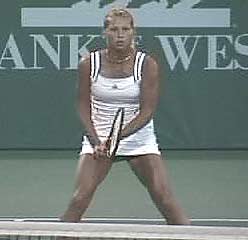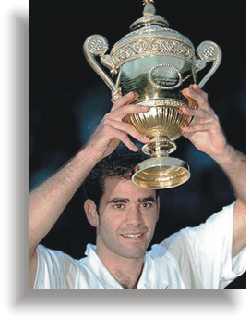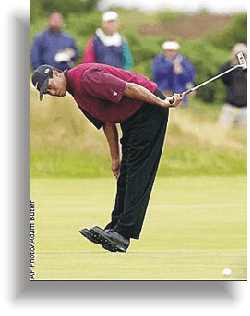|
Features
|
||||||||||||
|
Here’s my point, despite the increasing
devolution of media coverage about tennis into a soap opera with balls –
e.g., Anna Kournikova’s love life and bra ads; Jelena Dokic’s
alcoholic father; Pete Sampras’ love life; Alexandra Stevenson’s
parentage; Martina Hingis’ love life; Jeff Tarango’s rants; Andre
Agassi’s love life, and more – you can still obtain the equivalent of
a Bachelor of Science degree in victory, personal performance, and
competitive excellence from a regular and keen scan of the sports page,
the official textbook of Professor Jamison’s Lowbrau University.
For a Ph.D. attend our grad school where you’ll learn why the great ones are great and the rest of the pack is, well, the rest of the pack. Required reading includes TENNIS, Sports Illustrated, ESPN magazine, and Golf Digest among others. Hidden amidst the stats, standings, romances, instruction, summaries, and plea bargains of errant sports heroes are powerful lessons on how to bring out your best whether in tennis, baseball, golf, and other sports. Here’s some proof.
Short Term Memory Loss
Boomer Esiasen, formerly of Monday Night Football
fame, offered this sliver of apparent humor in a Lowbrau University
sports page quote: “The best thing about Jake Plummer [oft-intercepted
Phoenix Cardinal quarterback] is that he doesn’t have a memory.”
Esiasen’s observation is less humorous than it is profound and goes to
the core of concentration, of being in the zone.
Can you give me a sharper description of how you as an athlete remain confident and stay in the moment when things go south; of how you can avoid letting past problems ruin present performance?
‘Having no memory’ is genuine Zen, something
Shunyru Suzuki would have appreciated being mentioned on ABC Television
and then quoted at Lowbrau. Obviously, it transcends football. Here’s a
case study.
Andre Agassi had ‘no memory’ during the
semi’s of the 2000 Australian Open. In a fourth set tiebreaker with Pete
Sampras serving for the match, Las Vegas’ favorite son stood on the
baseline awaiting apparent annihilation. Sampras was up two sets to one,
ahead in the tiebreaker 5-4 and loading his service flame thrower with
high octane flammables to advance to the finals.
|
Now, please remember this: Sampras had aced Agassi
37 times in the match; Sampras had just won the preceding set’s
tiebreaker 7-0; in fact, Sampras had won every tiebreaker with Agassi
during the previous five years! Remember all of this because Andre Agassi
did not have a memory of it.
Waiting for the imminent scorchers that could heap
further humiliation on his stubbled but untroubled head, Agassi had no bad
memories, no dire expectations, no fear, no nerves. No nothing! As quoted
in Lowbrau U’s Sports Illustrated, Andre described his eerie mindscape,
“Your ears are ringing, you can’t even hear yourself grunt. And then
in some strange way it’s incredibly silent in your mind.” Barbra
Streisand was right. He’s a Zen Master. Agassi won the breaker, won the
fifth set, then beat Kafelnikov for the championship.
When you’re serving for the match on a day of shaky serves, putting for a birdie during a round of missed putts, or throwing a pass on Monday Night Football during a game when you’ve had as many interceptions as completions, Boomer’s observation is valuable: “Have no memory!” Here’s more from Lowbrau University.
The Heart of A Champion
TENNIS, reflecting on the quality of Pete Sampras’
‘heart’, refined the difference between a “winner” and a
“champion”. Deion Sanders, Greg Norman, Mike Tyson (let’s add boxer
Oscar de la Hoya, golfer John Daly, and, until recently, Mary Pierce) are
“winners”.
Steffi Graf, Cal Ripken, and Hakeem Olajuwon
(let’s add Tiger Woods, Michael Jordan, Joe Montana, and after her
gutsy championship performance in the 2000 French Open, Mary
Pierce) are “champions”. What’s the difference according to writer
John Feinstein? “A champion is someone who wins when it isn’t easy;
someone who gets it done when mere physical prowess isn’t enough,” he
states. In other words, a champion, even on a bad day, never quits looking
for a way to win, never throws in the towel.
|
Feinstein’s definition is a very important nugget
of performance wisdom, a concept worth incorporating into your competitive
perspective. Do you mentally call it quits when you’re having an off
day? Or, does it spur you to try harder? Does a victory in that off-day
circumstance have greater or lesser value in your mind? This is important
to assess because it goes to whether you have the heart of a champion.
Importantly, if you don’t, you can change it! Before you can become a
champion you must think like a champion. Champions put the highest value
on victories that come from the heart.
Sampras, in the course of winning Wimbledon and capturing his 13th Grand Slam title, displayed huge championship heart during an early round match with Jason Gimelstob. 48 hours before the scheduled encounter Pete was in the hospital undergoing an MRI on his left leg. 20 minutes before the match he was hooked up to an hi-tech electric stimulator in an effort to reduce severe pain from the extreme tendonitis in his left shin. After walking gingerly onto Center Court, he lost the first set 2-6. But Pete Sampras has ‘heart’. As Selena Roberts wrote in the Lowbrau’s NY Times sports section, “Once he (Sampras) understood how much pain there would be,” he was OK. That’s how a champion thinks.
Not to stretch Feinstein’s point, but my
co-author of WINNING UGLY (Simon and Schuster), Brad Gilbert, now
Agassi’s coach, was the king of winning “when physical prowess isn’t
enough.” In a Masters match in New York’s Madison Square Garden, John
McEnroe, sensing his own defeat, hissed bitterly during a changeover,
“Gilbert, you don’t deserve to be on the same court with me.” Mac
lost the match and abruptly quit tennis for seven months following the
‘shame’ of losing to Gilbert who, like all champions, knew how to win
“when mere physical prowess” wasn’t enough.
Jack Nicklaus supported Feinstein’s definition in
a sports page quote at Lowbrau U. by observing that the victories he is
proudest of are those achieved “when I wasn’t playing at my best.”
That’s when his ‘heart’ was tested. Like Nicklaus, Sampras is a
champion. So is Gilbert. They’ve all got ‘heart’. Do you? If not,
get your thinking straight. Cherish those matches in which your ‘A
game’ isn’t there or when you’re playing hurt. It’s an opportunity
to win that most glorious kind of victory – a victory won with
‘heart’. Those lacking it immediately start looking for the exit door
when things aren’t going their way. They’re called quitters. Here’s
more.
|
The June 26th issue of Sports Illustrated had three
large events to cover: the historic U.S. Open triumph of Tiger Woods;
Oscar de la Hoya’s championship fight with Sugar Shane Mosley; the Los
Angeles Lakers NBA championship under Phil Jackson. In each feature
article, in addition to the usual coverage and personality stuff, a few
gems of competitive wisdom were presented for students at Lowbrau.
First up, Woods’ and his historic win at Pebble Beach – 15 strokes ahead of second place finisher Ernie Els. In victory, Woods broke records that went back to an era when golf was played with a rock and a stick. Hidden amidst the stats and deifying observations from other contestants (e.g., Tom Watson: “Tiger has raised the bar and he’s the only one who can jump over it.”), were some subtle, but empowering insights.
Even though Tiger was sinking plenty of putts
during his Wednesday practice round, he didn’t like the way “the ball
was turning over” on its way to the hole. So, on the eve of the U.S.
Open, Woods was out in the chilly Pacific fog as darkness closed in,
meticulously honing his stroke on the practice green at Pebble Beach. He
was seeking a level of perfection only he could identify. (He applied that
same level of perfection again when he won The British Open recently.)
Now, here’s the Lowbrau University gem of wisdom.
Tiger’s coach, Butch Harmon, described Woods’ approach to practice and
performance as “ceaseless work”. For a moment, think about the depth
of what that casual comment represents: ceaseless work. Work that is
ceaseless. Do we comprehend what ceaseless work is?
Are you interested in winning? Is “ceaseless work” part of who you are? It is for Tiger. Is it a potent motivator to know that even those blessed with the greatest talent apply the greatest effort to their abilities. Andre Agassi applied “ceaseless work” during his most
|
Those who aspire to greatness, or winning a 4.0
tournament, should comprehend what’s going on at the pinnacle of
performance. It starts with work. It ends with work. It’s all about
work. Ceaseless work.
Next, Lowbrau University’s seminar on the
Lakers’ NBA championship and the transformation wrought by Zen coach
Phil Jackson. What wisdom did he impart to the perennially overweight and
underachieving Shaq O’Neal and the egocentric Michael Jordan wanna-be
Kobe “Let me run the offense” Bryant? Simple, according to Lowbrau
U’s Sports Illustrated textbook: “Under the tutelage of coach Phil
Jackson, O’Neal and Bryant learned how to put a leash on their egos, how
to replace panic with patience, and how to let themselves be coached. In
short, they developed the qualities of champions.”
What’s teamwork all about? See above.
Why Be Afraid of Something You Want?
And, finally, a calming Lowbrau U. perspective on
competing in high pressure situations from boxer Sugar Shane Mosley.
Reacting to speculation that he would wilt under the glare of
international attention and stress surrounding his title fight with
glamour boy Oscar de la Hoya, he observed in SI: “Why be afraid of
something I want?”
Exactly! Why be afraid of what you want? Sugar
Shane had it absolutely right in his clear and cleansing perspective on
perceived pressure surrounding ‘the big event’. Do you share his
outlook?
How many times have you gone into a match with
trepidation rather than eager anticipation? How often have you framed the
upcoming match negatively in your brain? Maximum opportunity, attention,
money, glory, and victory are what drives the great ones just as winning
the commemorative ashtray for first place in the local tournament means
something to you (and me). Jangled, tangled, performance-crushing raw
nerves before the match? Remember the sage advice of our visiting
professor, Sugar Shane Mosley: “Why be afraid of something you want!”
Go after it with gusto! Did I mention he won the fight?
And so, a quick tour of the curriculum at Lowbrau University. Our textbooks are available free at most barbershops and dentist’s offices, sports sections are laying around everywhere. If you pay close attention, you’ll find powerful lessons in personal performance and victory hidden beneath the stats, standings, and scores. And remember, you don’t have to pay an admissions fee at Lowbrau, all you have to pay is attention. Close attention.
Your comments are welcome. Let us know what you about think Steve Jamison's article by emailing us here at TennisONE.
Steve Jamison is available for personal appearances at your next event. Contact www.winningugly.com.
 Winning
Ugly T-shirts make great gifts for that special tennis player in
your life and for sportsmen and women in general. Winning
Ugly T-shirts make great gifts for that special tennis player in
your life and for sportsmen and women in general.
Looks great on the court or on the town. Available in Sizes M - XL* Click here to order. *Winning Ugly hat sold separately. |
Last Updated 8/1/00. To contact us, please email to: webmaster@tennisone.com
TennisONE is a registered trademark of TennisONE and SportsWeb ONE; Copyright 1995. All rights reserved.






